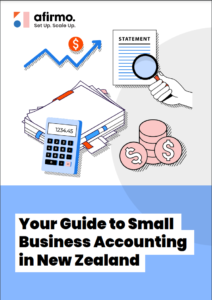As a small business owner in New Zealand, you know that accounting is a crucial part of your business operations. Keeping track of your income and expenses is essential to understanding your financial situation and making informed decisions.
However, accounting can be overwhelming, especially if you do not have an accounting background. Let’s review the essential accounting tasks that small businesses in New Zealand should prioritise.
Essential Accounting Tasks
- Track Income and Expenses: This is the most basic accounting task that every small business owner should do. Keeping track of your income and expenses helps you identify your cash flow and helps you evaluate the performance of your business. Use accounting software to record your transactions, comply with tax laws, and get a complete financial picture of your business.
- How to Invoice: Invoicing is the process of requesting payment for the products or services your business provides. As a small business owner in New Zealand, you must comply with the country’s invoice requirements. Ensure to include the necessary information like the business name and address, client’s name and address, date of the invoice, and amount due. Using online invoicing software can help you simplify this task.
- How to manage Accounts Receivable: Accounts Receivable is the money owed to your business for goods or services provided to a client but not yet paid in full. Monitoring and managing Accounts Receivable is critical for cash flow and business sustainability. You can implement strategies like offering early payment discounts, following up on overdue payments, and regularly assessing credit risks of clients. You may also need to carry out enforcement action when customers do not pay.
- Getting to grips Bank Reconciliation? Bank Reconciliation is the process of comparing your bank statement to your accounting records and verifying the accuracy of your financial transactions. It helps identify discrepancies, fraud, errors, and bank fees that could potentially impact your cash flow.
- The how-to of bank reconciliation: Start by gathering your bank statements, accounting records, and other financial documents. Next, match the transactions in your accounting records to the bank statement. Look out for any discrepancies, including duplicate payments, unrecorded transactions, and bank fees. Resolve these discrepancies and adjustments to ensure that your bank account and accounting books reconcile.
- Generating Financial Statements: Financial statements give you a summary of your business financials over a specific period. These statements include income statements, balance sheets, and cash flow statements. Generating Financial Statements helps you evaluate how well your business is performing and identify areas that require improvement.
- Types of Financial Statements: Income Statements, Balance Sheets, and Cash Flow Statements are three types of financial statements that small business owners in New Zealand need to understand.
- An Income Statement, also called a Profit and Loss Statement summarises your business’s revenue and expenses in a particular period.
- A balance sheet provides a snapshot of your business’s financial situation at a specific date and individual assets, liabilities and owners’ equity.
- Cash Flow Statements provide information about the movement of cash in your business, where it came from and how it was used.
- Payroll Management: As your business grows, you may need to hire employees. Payroll management requires a proper accounting system, including tracking the hours worked, calculating pay rates, and submitting ACC and KiwiSaver payments to the relevant authorities. Compliance with the employment laws in New Zealand is also essential.
- Tax Management: One of the essential aspects of small business accounting is tax management. Tax management involves planning, organising, and filing tax returns in a manner that maximises deductions and minimises tax liabilities.
New Zealand has a legal obligation for all businesses to register with Inland Revenue, file income tax returns, and pay taxes on time. Small businesses that do not comply with these obligations risk facing severe financial penalties and legal consequences. Non-compliance can harm your business’s reputation, which has a ripple effect on your employees, clients, vendors, and investors. Therefore, it is critical to keep track of your taxes, file tax returns accurately, and pay taxes timely to avoid any legal implications.
Tax management is also crucial when it comes to business planning. As a small business owner, you need to know how much tax you owe the government. This information is essential for budgeting, forecasting, and financial planning. Tax management allows you to make informed decisions about investing, hiring, and expanding your business. It also helps you identify areas where you can save on taxes by claiming tax deductions and credits.
Most small business owners find it hard to manage their taxes themselves, especially if they lack the relevant knowledge and expertise of tax laws and regulations in New Zealand. In such cases, it is essential to consider hiring the services of professional tax accountants.
In this digital age, software options like Afirmo exist that can help small business owners manage their taxes. Afirmo is user-friendly, affordable, and efficient. Afirmo software helps you track tax deadlines, generate accurate tax reports, and file returns. Tax management software allows you to automate some of the tax accounting procedures and streamline the process, making it less time-consuming and stress-free. (agreed we need to have an index page here to redirect to Afirmo Tax eBook)
Conclusion:
Accounting is a crucial part of every small business in New Zealand, regardless of the industry or size. By prioritising accounting tasks like tracking income and expenses, invoicing, managing accounts receivable, bank reconciliation, generating financial statements, and payroll management, small businesses can make informed decisions, monitor their cash flow, and sustain their operations.
Use accounting software like Afirmo to simplify your work and guide you through the process and ensure compliance with the relevant tax laws. As always, planning and staying organised will help you stay on top of your accounting tasks and achieve long-term business success.


